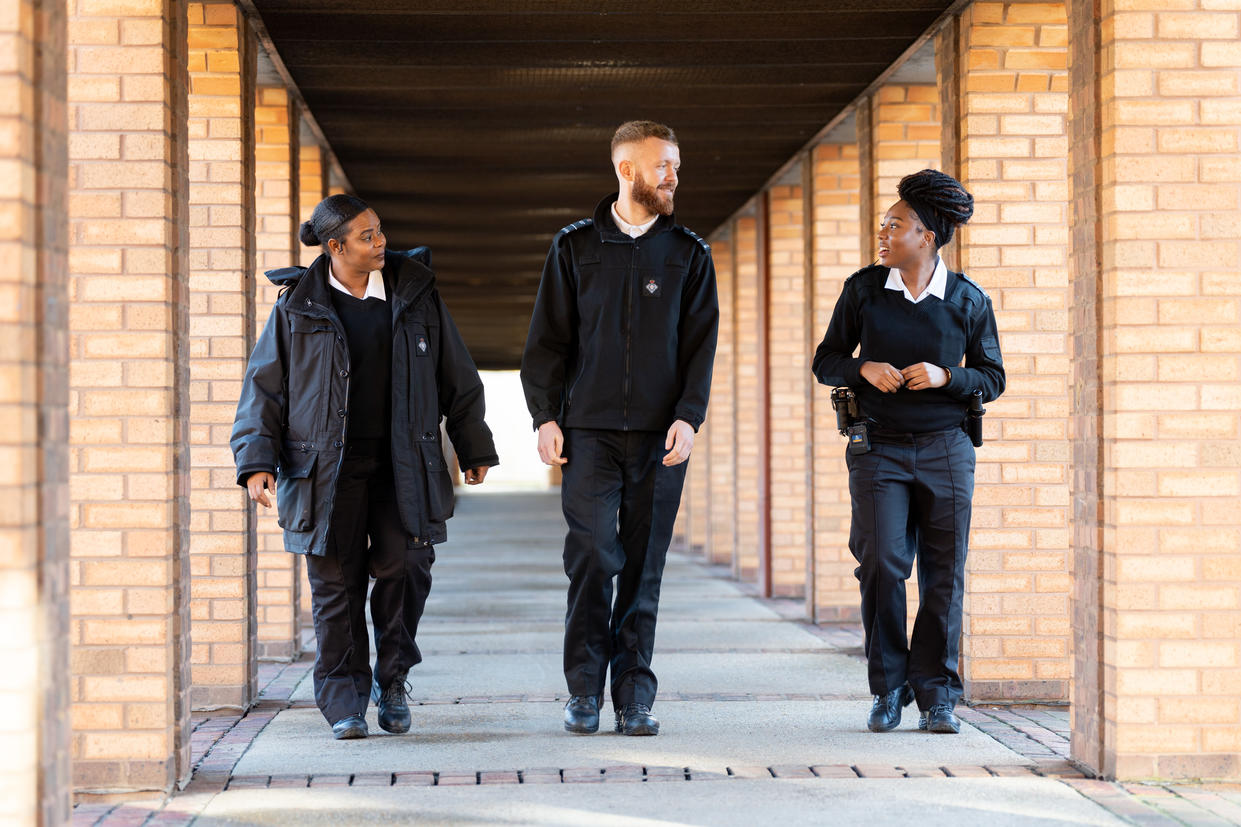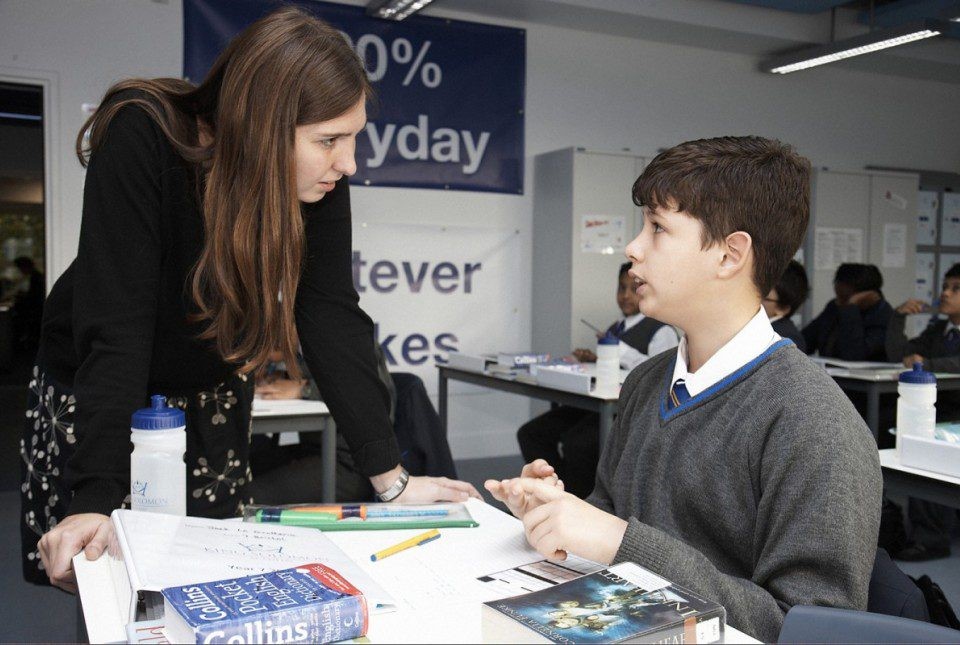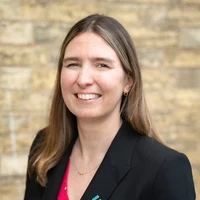How education can break the pattern of reoffending in UK prisons
Those who have been unsuccessful in education are much more likely to end up in prison, and to reoffend when they come out too. Natasha Porter, CEO and Founder of Unlocked Graduates explains how she is continuing to work towards Teach First's mission by bringing support for education and rehabilitation to the frontline of prisons. For this work, Natasha was awarded an OBE in the 2023 New Year’s Honours List.
The average prisoner has 15 previous convictions, and yet 58 per cent are functionally illiterate. Too many prisoners lack the education required to access employment post release, and don’t get the education they need in custody either.
Prisoners are often those who most struggled to engage at school. Many don’t want to return to a classroom in adulthood and need a huge amount of support and encouragement to do so.
This challenge was familiar as a teacher. How do you get every single child ready to sit down and learn in every single lesson? How do you engage those who are furthest from being able to do this? How do you build systems of high expectation and high support which reach every child?
That’s where Unlocked Graduates comes in for prisoners. We develop outstanding leaders to break cycles of reoffending in prison and beyond. We support leaders to transform prisons into places where lives are changed for the better and prisoners can receive support to flourish.
What is Unlocked Graduates?
Unlocked Graduates was established in 2016 as one of the recommendations of the Coates’ review. We began with the explicit aim of attracting high-calibre graduates to work in prisons and inject new ideas, insights, and energy into prisoner rehabilitation.
Participants lead change on the inside that delivers change on the outside. The two-year programme offers a fully funded Master’s degree and excellent career development.

From hating being a pupil to loving being a teacher
I grew up in an affluent area of North London and did well at primary school, but the transition to secondary coincided with challenges in my personal life. Despite high levels of support and some very well-meaning adults, my life became increasingly chaotic and unmanageable.
I was first asked to leave a school in autumn term of Year 8. My school explained that my needs couldn’t be met by them, and my behaviour was too challenging. I was accepted into a different school later that year and they did their best to support me by making allowances: let me start at a different time and with different behaviour expectations from other pupils. There’s no way I could have been at this school without this special treatment, but it also embedded my sense of being different from others and ultimately meant the chaos of my life got worse. I was permanently excluded for a second time in February of my GCSE year and joined a small specialist school of 25 pupils for children who struggled to cope in mainstream education.
For me this was a game-changer. This school existed for children like me, who needed something mainstream schools couldn’t - and probably shouldn’t - provide.
The school didn’t try to resolve or even contain my issues, it just provided structures I needed to engage with learning. I already loved reading and here this translated into a love of academia. Without constant battles around boundaries, I was able to build positive relationships with teachers which were purely based on academics. I started to achieve academically.
Years later I stumbled across Teach First at a university careers fair and thought it looked like an interesting way to spend two years. I taught English literature at Islington Arts and Media School in London but never thought teaching or education would be my career.
Yet I fell in love with the job and Teach First's mission. I loved working with teenagers, I loved reading and talking about books every day. I really believe that being a central presence in children’s lives is an enormous privilege, and I loved having a job that mattered so much.
Supporting teenagers to reach their academic potential
My Teach First school was close to where I grew up. Many of the pupils I taught were better behaved and cleverer than I was. But it was eye-opening to realise their expected outcomes were radically different from those at my old school.
The difference? Crudely, educational outcomes correlated with what home looked like, and much of this linked with money. Growing up with parents working multiple jobs to provide, in areas which have high levels of crime, with substandard housing makes it much harder to achieve.
This disparity is deeply unfair and we should be furious about it. We cannot allow ourselves to lower expectations of what children can achieve because of these challenges. Instead, we need to meet challenge with support.

After three years at Islington, I joined the founding team of charter-style school King Solomon Academy (KSA) in London.
KSA was in the ward with the highest child poverty in London and many students lived in over-crowded homes. It felt particularly pertinent because I went to school less than a mile away, and my peers were all expected to go to university. The children at KSA were all just as capable, so why shouldn’t they get good results and also have the opportunity to go to university? We believed it was our job to provide the support to make that happen. Not for a majority of our children, but for all of our children.
KSA’s frontier cohort achieved ground-breaking results. 93% passed five GCSEs including English and maths. In English literature, 95% got a B or above. The reason KSA did so well? Every single person had high expectations of what the children could achieve, and relentlessly supported them to get there.
The power of Teach First’s ambassador community
Ambassadors have a responsibility to work towards the Teach First mission - ending educational disadvantage. We need to ask: “Where can I have the most impact on the mission given where I am in my life?”
When the opportunity arose to join the KSA team, I decided to dedicate myself to that. Once we had proven results at KSA, I wanted to scale the solutions we found, and so moved into policy work at the Department of Education and the thinktank Policy Exchange. After two years I had gained valuable experience, but missed being closer to the frontline.
When starting Unlocked, I messaged the Teach First ambassador community to explain my plans, and immediately other ambassadors came forward offering their support.
Josh McAllister shared everything from Frontline for us to use as a blueprint, Teach First founder Brett Wigdortz advised on sector engagement, recruitment director James Darley joined my founding board. Ambassadors like Matt Hood, Ndidi Okezie, Laura McInerney, Bex Cramer and many more all gave their time to listen to my plans. Maria Donovan, Bodil Isaksen and Libby Gray formed my founding team, and of course Dame Sally Coates was an early supporter for Teach First itself.
How Unlocked Graduates is helping prisoners
While schools have exam results, prison reoffending data isn’t publicly available. So, there are proxy measures we use to help measure success in reoffending reduction. Prisoners are less likely to reoffend if they have supportive prison officers while in custody. They also need the following:
- a positive support network (people)
- a home to return to (place)
- a job when they come out of prison (purpose)
Prison officers’ personal interactions make the difference. This is where Unlocked Graduates participants go the extra mile. Their care and attention can lead to behavioural changes, such as a reduction in drug misuse and self-harm associated with reoffending, and encouragement to engage with education, from getting a book from the library to attending classes which lead to qualifications.
When Max joined Belmarsh prison in London he redesigned the induction process, and used his relationship with prisoners to have them help him to decide what the first few weeks should look like. After his changes were implemented, self-harm during the first 12 weeks reduced by 37% compared with the previous three months.
At Pentonville Prison in London, Georgia sourced 1,000 reading glasses for £1,000 so prisoners could see to read, supporting their access and education.

Successfully securing jobs for prisoners
Employment post-release is crucial for reducing reoffending, yet only 16% of prisoners go into a job. At Wandsworth Prison, Lili Bidwell’s support meant that six weeks post-release, 39% of the prisoners she worked with had a job. This required solving a range of issues including for many, just securing identification (such as a passport), and also actively speaking to employers in the community and connecting them with suitable prison leavers.
We were really proud to see Lili receive the Prime Minister’s award for exceptional public service for this. She is now rolling this out nationally.
All these interactions have a huge impact on prisoners, their families, and their community. This reduces crime in our communities and makes all of us safer. It also decreases chances of intergenerational offending.
Receiving an OBE for Unlocked Graduates
I was thrilled to be awarded the OBE. It’s not a reflection of one person’s hard work; it’s a reflection of a great team.
We hope we’re making society better. Prison is an invisible part of the system, particularly those who come from more privileged backgrounds, and seeing this work recognised is important.
Our plea to all Teach Firsters
I’ve since learned that when I was teaching, many of my students had family members in prison. It’s a shameful secret that people don’t want their teachers to know.
The brother of a girl I taught recently told me that in their block of flats the same number of people didn’t go prison as did go to university. I had no idea that statistically in every year group, in every school in the country there is a child with a parent in prison each year. And in Teach First schools, the numbers are likely to be much higher.
These children need support. It is my plea to Teach First teachers to be thoughtful of how you speak about prison and prisoners. And also, how you support those children who do have a parent in prison. Charities like Children Heard and Seen are excellent for ideas with this.
Remember, you can reach out to your ambassador community via our networks for support in your work too.
